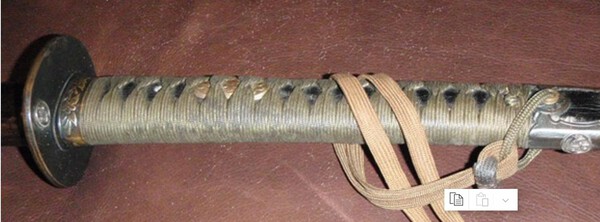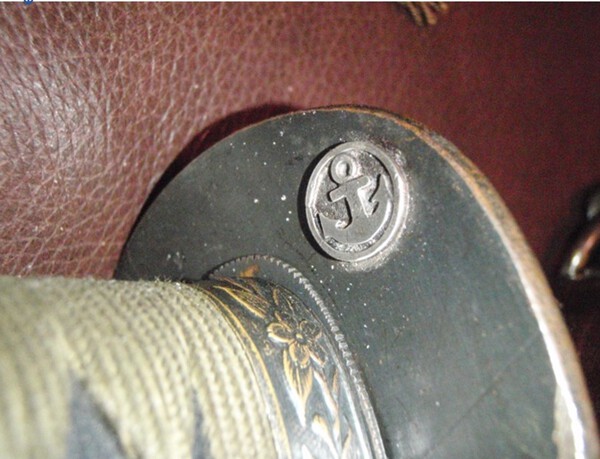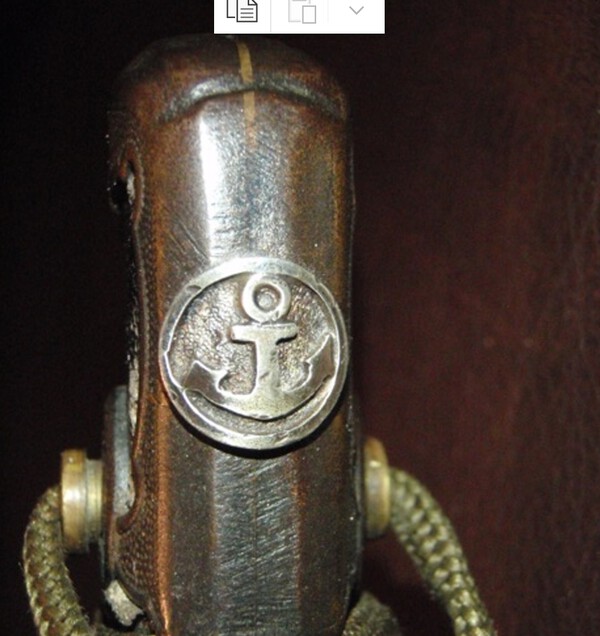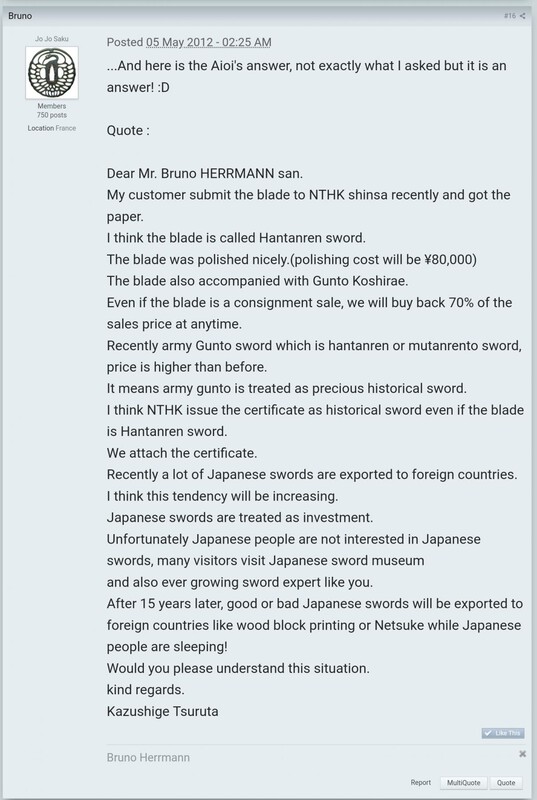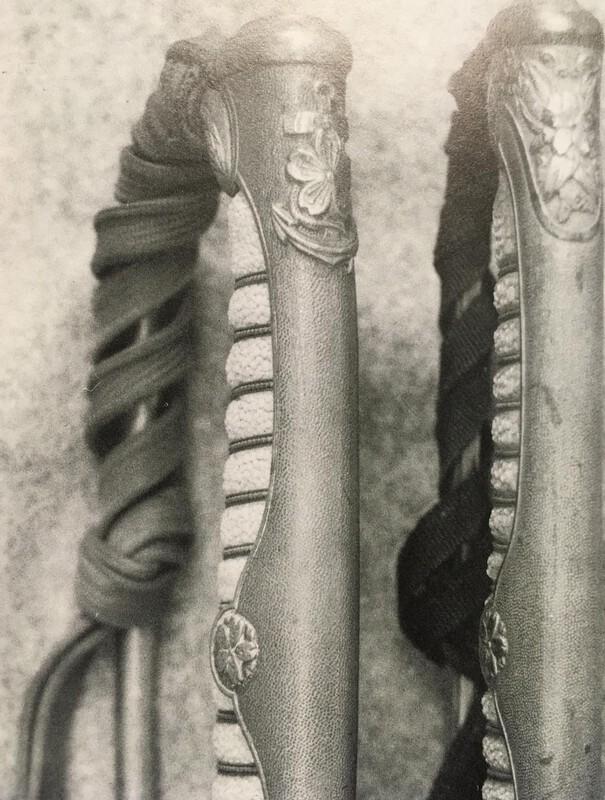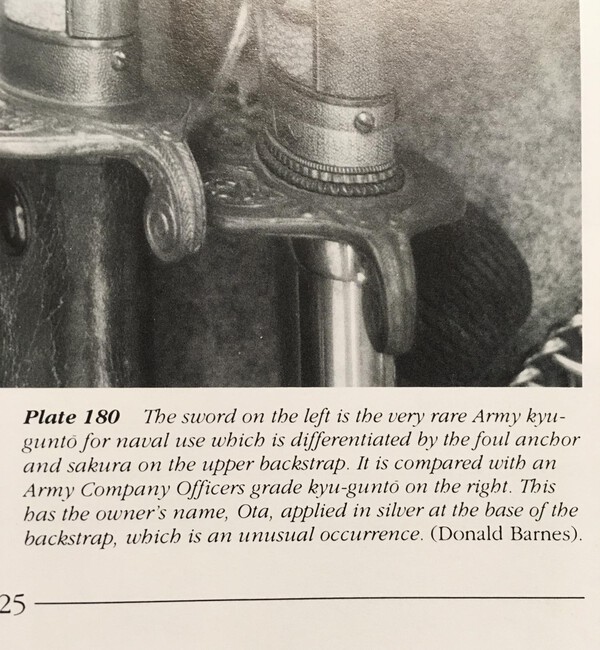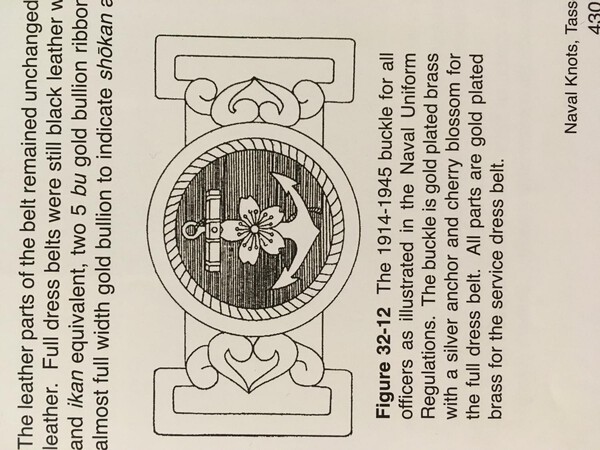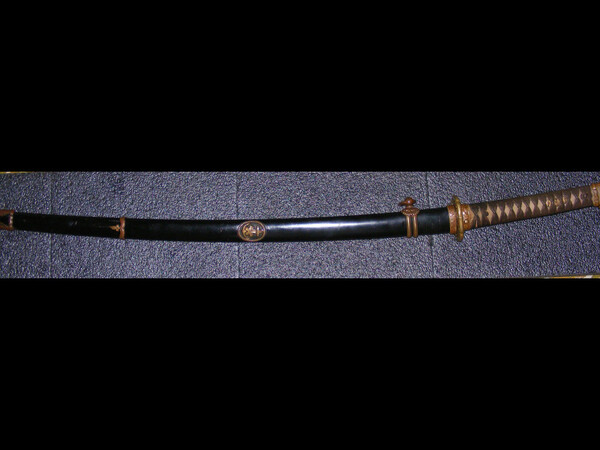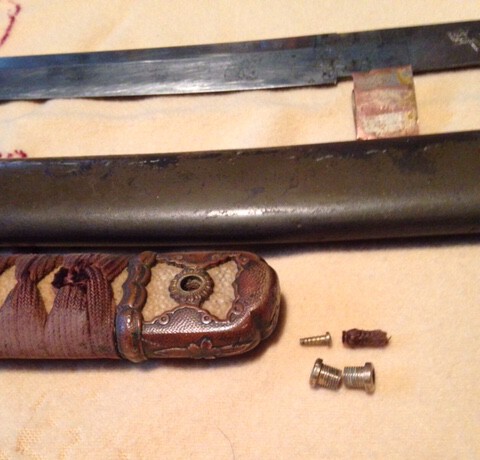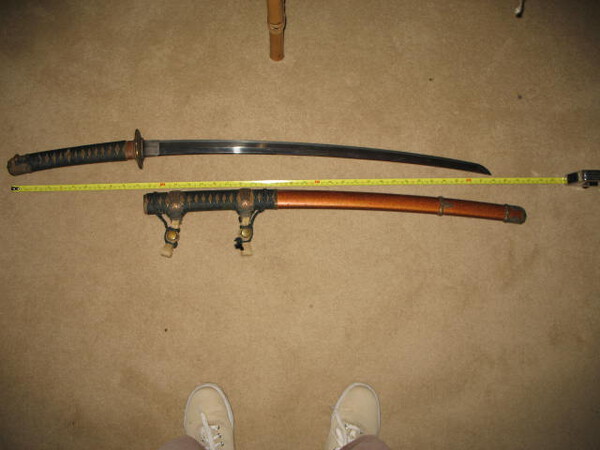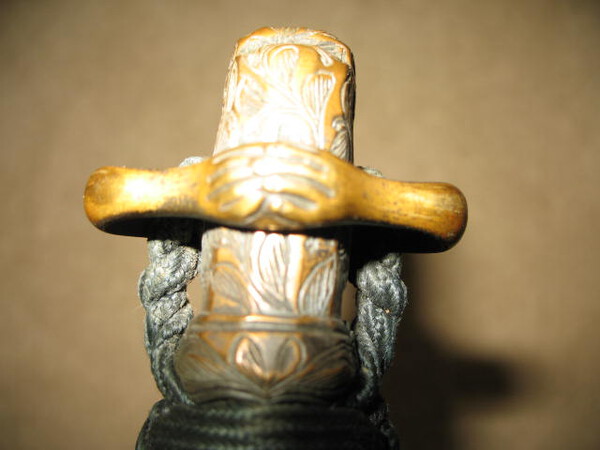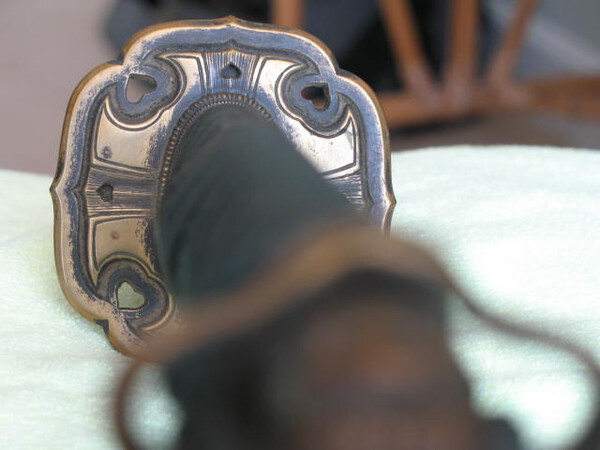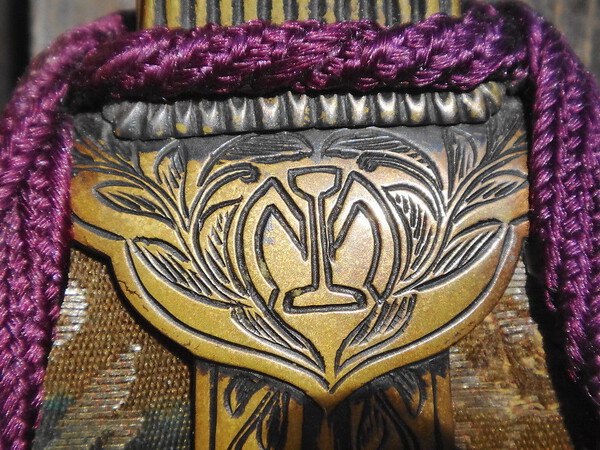-
Posts
14,112 -
Joined
-
Last visited
-
Days Won
169
Content Type
Profiles
Forums
Events
Store
Downloads
Gallery
Everything posted by Bruce Pennington
-

Koa Isshin With Nthk Papers
Bruce Pennington replied to PNSSHOGUN's topic in Military Swords of Japan
Here’s the official word from Nick Komiya, Warrelics: “No, Gunto means "Military Sword" and refers to its whole structure "Lock, stock and barrel" so to speak. An Army sword is Rikugunto and by the same principle, a Navy Sword is Kaigunto. If you wanted to say "Military sword fittings" you would have to say either "Gunto no Gaisou" or "Gunto no Koshirae". Defining gunto as a "sword in military fittings" is also acceptable, but not really to the point.” -

Koa Isshin With Nthk Papers
Bruce Pennington replied to PNSSHOGUN's topic in Military Swords of Japan
There are separate words for the blades in military fittings - nihonto, gendaito, showato - and these words apply regardless of the koshirae they are fitted out with. A family sword, whether 100 years old or 500, once bought buy or donated to the war department became a military possession, therefore an army sword or navy sword. A nihonto in military fittings is a gunto or kaigunto as is a showato in the same fittings. They have become war swords owned by the government - gunto. -

Koa Isshin With Nthk Papers
Bruce Pennington replied to PNSSHOGUN's topic in Military Swords of Japan
Interesting David. I looked it up on The Japanese Sword Index and they agree: “GUNTO - army or military sword mountings” I had always been told that “gun-to” meant “army-sword” so it’s weird that the word is actually applied to army koshirae (KOSHIRAE - sword mountings or fittings). Seems odd. -

Attention Mantetsu Owners: A Survey
Bruce Pennington replied to Bruce Pennington's topic in Military Swords of Japan
A minor update on the Mantetsu mei dateline. I've found a '39, chopped to waki size, but having bothe the Dalian Railway Stamp AND the Koa Isshin mei. It's a Spring of '39 so there might have been a transition early in the year where both appeared together. So for now, here's the mei timeline: Showa 13 (1938) Winter - Dalian Railway Stamp; no mei Showa 14 (1939) Spring – Dalian Railway Stamp; 興亜一心 (Koa-Isshin) 満鉄作之 (Mantetsu Saku Kore) Showa 14 (1939) to Showa 16 (1941) : 興亜一心 (Koa-Isshin) 満鉄作之 (Mantetsu Saku Kore) Showa 17 (1942) : 興亜一心 (Koa-Isshin) 満鉄謹作 (Mantetsu Kin-Saku) Showa 17 (1942) to Showa 18 (1943) : 興亜一心 (Koa-Isshin) 満鉄作 (Mantetsu Saku) Showa 18 (1943) to Showa 19 (1944) : 満鉄鍛造之 (Mantetsu Tanzo Kore) Showa 19 (1945): 興南一誠 (Kou-nan issei) [only 1 example] -
Is that chome flaking on the blade? I don't think I ever seen a chromed fake before. But if its just normal corrosion on steel, then never mind. The islanders of SE asia DID make their own swords during the war, so that's a possibility. It would be nice to know the the kanji on the habaki are legit or jibberish. Jibberish would lock it in as fake.
-

Mantetsu Suriage Or Wak?
Bruce Pennington replied to obiwanknabbe's topic in Military Swords of Japan
I was reviewing this discussion and noticed the hamon carries around the curve of the kissaki, meaning the tip wasn't shortened, so for the nagasa to be shorter than standard, someone had to move the hamachi and munemachi. This is not hard, I guess for a professional. Anyone know if there is a way to tell? I agree with Kurt that the mei is correctly placed around the mekugi-ana. Is there a standard distance from the ana to the machi? If the machi were moved, this might show in the measurement? -

Anchor Mon On Rinji (Type 3)
Bruce Pennington replied to Bruce Pennington's topic in Military Swords of Japan
Update: Shared this discussion with Richard Fuller. He passed these pictures of a gunto with the identical set-up as Edward's. Here's his thoughts on it: "My guess is that was used by the Etajima Naval College or other naval education establishments for drill lessons but would need to be carried by adult students. Have not been able to find the significance of the foul anchor variations." This quote came with the pictures: "The plain anchor-in-circle is the cap badge of Navy Preparatory School students so it is possible this sword was owned by such a school. Possibly used for sword etiquette training or parade purposes. Ted Simpson, U.K." -

Koa Isshin With Nthk Papers
Bruce Pennington replied to PNSSHOGUN's topic in Military Swords of Japan
Thanks Eric! Hate to say it, but I didn't even know there was a difference. It's a world I'm totally ignorant of. I'm sure you're right David, but I, for one, don't have the time, money, or interest. WWII militaria is all I can manage. It's like everything else, some people can stare all day at a Picasso - I'd rather look at a perfectly done Philipino painting of a dafodil. I see the beauty of nihonto, it's just not my area of interest. -

Japanese World War 2 Sword Help
Bruce Pennington replied to leobrb's topic in Military Swords of Japan
Is it "Leo"? Need to go to settings and post a name for us, thanks. Both your examples are poor fakes, so it's a good thing you asked first! I agree with John that you CAN find something for $750, but not something in great shape. Even the NCO blades have gone up in the past year. You can find some Type 32s and Type 19s under that price. Both of Chris's recommendations are great. The auction houses I've shopped tend to sell at top dollar, so I doubt you'll get anything cheap that way. Crimson Mist sometimes has some reasonably price gunto: http://www.cmmilitaryantiques.com/search.php?pcat=3 Gunto Art Swords have quality gunto, but prices usually reflect that (I have bought 2 from him, at above market rates, but both were fabulous and I HAD to have them!): http://www.guntoartswords.com Here is one that is legit (I had to search through 4 fakes before I found this one!) https://www.ebay.com/itm/EXCELLENT-WWII-Japanese-Samurai-Sword-NCO-SHIN-GUNTO-Katana-World-War-2-BLADE/223497999128?hash=item340984d318:g:Oe0AAOSwUvVcxSFN&redirect=mobile -

Koa Isshin With Nthk Papers
Bruce Pennington replied to PNSSHOGUN's topic in Military Swords of Japan
Neil, I agree fully. Sure, the showato maybe shouldn't reach the higher levels of the ratings as they gendaito smiths works really are different in the art of the craft, but some showato have real art as well, and some, like the Mantetsu were so good there was a waiting list of officers wanting them. Yes, it was actually a NTHK papered Mantetsu that started this discussion. -

Koa Isshin With Nthk Papers
Bruce Pennington replied to PNSSHOGUN's topic in Military Swords of Japan
Found a similiar discussion from 2012: http://www.militaria.co.za/nmb/topic/9526-showato-in-Japan/ Someone actually got a response for the team: It verifies what we've learned here, that they are papering for "historical" reasons. He lamented the fact that "Japan sleeps" while these precious items are being shipped out of country to collectors abroad. -

Anchor Mon On Rinji (Type 3)
Bruce Pennington replied to Bruce Pennington's topic in Military Swords of Japan
Thanks Bryce! I offer the following as a "possible" solution: Fuller & Gregory have a kyugunto that he calls "army kyu-gunto for navy use". The kyu is obviously not faked, so there must be a reason and army sword is marked with a navy anchor. Whatever that reason is - is probably behind these gunto with anchors. We can specualate about shortages or other ideas, but I beleive, like I stated above, fakers copy real stuff. So what there WERE real ones. The fact that we don't know the WHY doesn't invalidate their existance. On a side note, the one on the saya is the same as the one in Dawson's book from a navy belt. Note the rope around them both. Interesting topic. -

Anchor Mon On Rinji (Type 3)
Bruce Pennington replied to Bruce Pennington's topic in Military Swords of Japan
Found this on an old thread (pg 46). Thought I'd add it as is generates similar questions: Thread found here: http://www.militaria.co.za/nmb/topic/6879-unusual-shingunto/ -
It's been a while since I posted the latest version of my Stamps document. Ver 1.8 has a few kakihan added, and the latest "Company" stamp found on a Type 95 drag. As Fuller's chart on hotstamps and kakihan are hand drawn, I thought I'd start collecting actual examples. I've got 6 already, but could use real examples of: Kanenari Ishihara Nyudo Kanetaka Kojima Katsumasa Nagamura Kiyonobu Nagamura Kiyonubo (with "fuji" kanji) Suetsugu Shigemitsu Fujiwara Yoshikane Kanesaki Itsuryushi Tohimitsu
-

New sword variant discovered?
Bruce Pennington replied to IJASWORDS's topic in Military Swords of Japan
Steve, looks like a standard, rusty Rinji/Type 3/Type 0/'44 model missing the ito. -
Bryce, While that is possible, it doesn't explain them all. NCO Type 95's used almost exclusively metal sarute, yet the majority of them in circulation today show up without them. I've never heard anyone say why they go missing. Another possiblity is that when the Allies forced the Japanese to surrender their gunto, many would "deface" them to some degree - rank tassels were removed (maybe removing the sarute in the process?), family crests scratched off, guys turning in rifles often scratched off (or attempted to) the Imperial chrysanthimum stamp. Just an idea. My dad's Mantetsu still had the stump of the cloth sarute that was originally there, along with a tiny metal wedge that secured it in the barrel screw. So, it was easy to decide which kind to refit it with. If yours doesn't have any pieces inside, then it's really up to you to decide which kind you like. No right or wrong in that.
-
Sterlin, Check out this thread on the Sharpening and Dulling of blades from Nick Komiya at Warrelics: http://www.warrelics.eu/forum/Japanese-militaria/sharpening-dulling-blades-were-taken-granted-675938/ I can't say for sure that your blade was dulled for this reason, but it is a possibility.
-
Neil! I just shake my head and laugh out of astonishment. Where do you get these things!?!?!
-

Railway Swords & Stamps
Bruce Pennington replied to Bruce Pennington's topic in Military Swords of Japan
Stegel, fabulous examples! And I did not have that serial number on of that second one. Too bad you don't have it for that first one! Yeah, I don't know what to think about that purple ito. They DID have some purple wraps back then, but this one just looks too new. The last one with the South China railway is the second I've seen now, outside of Dawson's one, and it looks like they are all non-Mantetsu. Dawson stated that the SCR commissioned the blades, so they must have been made by other smiths. -
Dan, That's unique! And I have not seen that before. Shamsy probably has, though you might PM him to check.
-

Samurai Katana - fake or real?
Bruce Pennington replied to Anna-wve's topic in Military Swords of Japan
Anna, the Damascus steel is a dead giveaway. Plus the kanji are junk. There are a lot of these showing up lately. Amazingly, they were being produced right after the war to make a killing offf the vast numbers of G.i.s during the occupation. -

Attention Mantetsu Owners: A Survey
Bruce Pennington replied to Bruce Pennington's topic in Military Swords of Japan
Thanks Jean-Pierre, I also have that. I posted it on the Battle Damage thread as well: http://www.militaria.co.za/nmb/topic/23378-any-shin-gunto-with-battle-scars/page-2?hl=+battle%20+damage I’ve pent a few days scouring the web for these. About the only ones I won’t have is something newly posted somewhere. -
That’s a beauty Dan! The Tokyo star should put the manufacture date at or after late ‘40, early ‘41. Stengel or Shamsy might be able to narrow that based on serial number.
-

Railway Swords & Stamps
Bruce Pennington replied to Bruce Pennington's topic in Military Swords of Japan
Wow Trystan, completely new to me, and not on Dawson’s chart. Thanks for that one!



